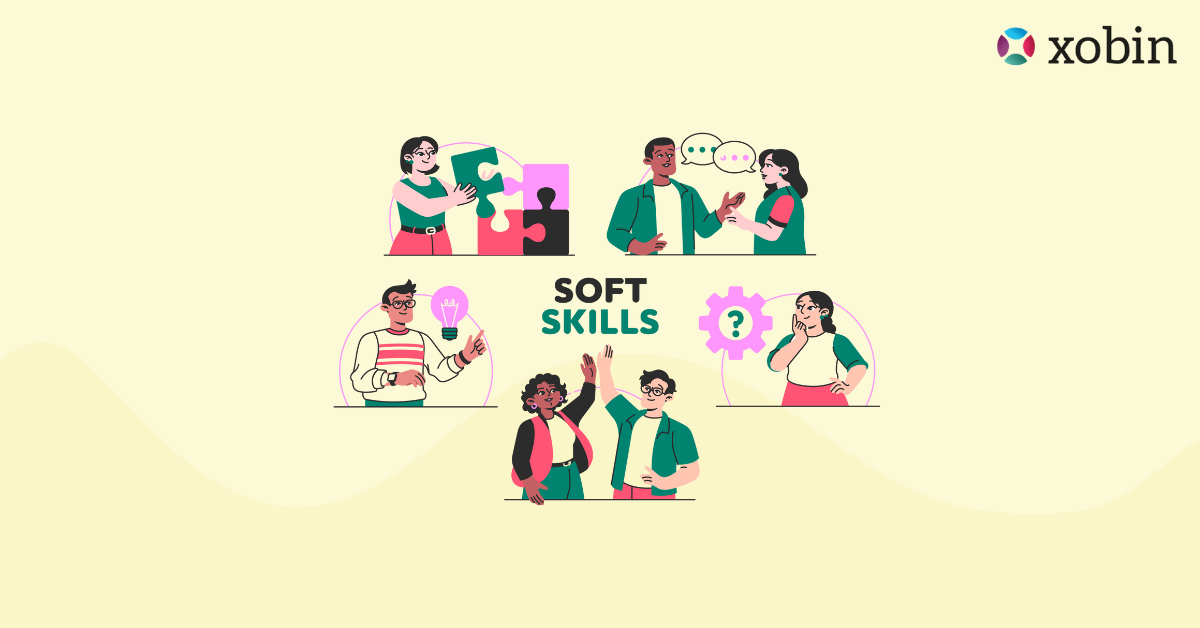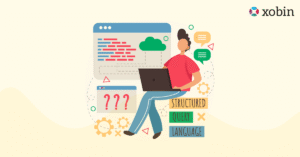In today’s dynamic business environment, soft skills have become more critical than ever. For top executives steering organizations through change and disruption, understanding soft skills is vital, not just for hiring but also for building resilient, high-performing teams. This comprehensive guide dives deep into what soft skills are, why they matter, and how employers can accurately assess these skills to make smarter talent decisions.
Table of Contents
TL;DR – Key Takeaway!
- Soft skills are the non-technical skills like communication, leadership, and emotional intelligence that drive team success and organizational resilience.
- These power skills are now more valuable than ever, especially for HR leaders aiming to build high-performing, adaptable teams.
- Today’s most in-demand soft skills include critical thinking, adaptability, collaboration, and emotional intelligence.
- Employers can assess soft skills through behavioral interviews, situational judgment tests, psychometric testing, and AI-driven evaluations.
- Unlike hard skills, soft skills show personal traits and people skills that influence culture and boost productivity.
- Developing soft skills leads to better employee retention, leadership impact, and customer satisfaction.
- Xobin’s AI-powered assessment platform helps assess, track, and train soft skills through real-time analytics, custom skill-based assessments, and behavioral testing.
What Are Soft Skills?
Soft skills refer to the personal attributes, social abilities, and communication traits that define how employees interact, collaborate, and solve problems in the workplace. Unlike hard skills, which involve specific technical knowledge or job-based tasks, soft skills focus on how people behave and interact. They cover essential traits like emotional intelligence, adaptability, teamwork, and critical thinking.
These non-technical skills play a key role in shaping workplace culture and boosting productivity. They are also often called “power skills” because they drive effective leadership and innovation.
Some common examples of soft skills include
- Communication skills
- Problem-solving ability
- Time management
- Conflict resolution
- Leadership and teamwork
- Empathy and emotional intelligence
- Adaptability and resilience
These skills determine the ability to get a job done efficiently and collaboratively. In today’s complex business landscape, soft skills often differentiate a good employee from a great one.
Join 5000+ companies transforming hiring through science-driven soft skills analysis. Learn how to integrate Xobin into your recruitment strategy today.
Book A DemoWhich Soft Skills Are Most In-Demand for Employees Today?
The modern workplace demands a unique blend of important soft skills that enable teams to navigate uncertainty and work cohesively. Employers often look for people with strong social skills because they boost teamwork and drive new ideas.
Recent surveys and HR reports show that the most in-demand soft skills right now include:
- Communication and Listening: The foundation for all interpersonal interaction, effective communication helps prevent misunderstandings and promotes clarity.
- Emotional Intelligence (EQ): Understanding and managing one’s own emotions while empathizing with others is critical for leadership and teamwork.
- Adaptability: Flexibility in the face of change is a prized attribute as organizations evolve rapidly.
- Critical Thinking and Problem Solving: The ability to analyze situations and make sound decisions reflects strong situational awareness.
- Collaboration and Teamwork: Working seamlessly across functions and geographies is vital for organizational success.
- Time Management: Prioritizing tasks and managing deadlines improves overall productivity.
- Leadership and Motivation: Inspiring others and driving results through influence rather than authority.
This evolving soft skills list shows how important personal qualities have become alongside technical knowledge. Even in roles that rely heavily on technical skills, soft skills help employees grow and succeed.
Did You Know?
A LinkedIn study found that 89% of hiring failures happen due to a lack of soft skills, not because candidates fall short on technical abilities.
How Can Employers Accurately Assess Soft Skills?
Evaluating soft skills brings unique challenges when compared to measuring hard skills. Unlike certifications or tests that measure technical knowledge, soft skills are inherently subjective and often demonstrated through behavior and attitude.
Did You Know?
The World Economic Forum listed power skill categories like creativity, resilience, and adaptability as essential for future-proofing your workforce by 2030.
To address these challenges, employers can adopt a multi-faceted approach to soft skills assessment:
1. Behavioral Interviews
Behavioral interview questions help uncover how candidates handled real-life workplace situations. Asking candidates to describe specific examples of teamwork, conflict resolution, or leadership provides insight into their interpersonal ability and decision-making process.

2. Situational Judgment Tests (SJTs)
SJTs present candidates with hypothetical scenarios and ask them to choose or rank responses. This method effectively measures situational awareness and problem-solving aptitude.
3. Psychometric Assessments
Standardized psychometric tests evaluate personality traits, emotional intelligence, and cognitive abilities related to soft skills development. These assessments offer objective data to complement interviews.
4. Role-Playing Exercises
Simulated work scenarios help recruiters watch communication, leadership, and teamwork skills in real-time.
5. 360-Degree Feedback
For existing employees, collecting feedback from peers, managers, and subordinates can help assess personal attributes that contribute to workplace effectiveness.

6. AI-Driven Talent Assessment
Leveraging AI-powered platforms, such as Xobin’s innovative AI-based talent assessment software, can standardize soft skills testing through customized test creation, automated scoring, and unbiased analytics.
Want a data-backed way to assess soft skills at scale? Discover how AI-powered assessments help reduce guesswork and improve hiring outcomes.
Book A DemoDifference Between Hard Skills and Soft Skills
Knowing the difference between hard skills and soft skills plays a key role in building well-rounded recruitment and development plans.
| Hard Skills | Soft Skills |
| Technical knowledge (coding, finance, etc.) | Personal traits and social abilities |
| Measurable and teachable | Often intangible and harder to quantify |
| Job-specific certifications | Cross-functional and universally relevant |
| Usually learned through formal education | Developed through experience and practice |
Both skill sets are complementary. While hard skills ensure the ability to get a job done technically, soft skills determine how effectively tasks are completed within teams and organizational culture. For executives, recognizing this difference guides better talent acquisition and development strategies.
Why Are Soft Skills Crucial for Success in the Workplace?
Numerous studies confirm that soft skills are vital predictors of job performance and leadership potential. Companies with a strong emphasis on soft skills development enjoy numerous benefits:
1. Enhance Collaboration and Teamwork
Strong interpersonal interaction skills improve communication and foster trust among team members, reducing conflicts and increasing cooperation.

2. Drive Leadership Effectiveness
Leaders with developed soft skills motivate, influence, and manage diverse teams more successfully than those who rely solely on authority.
3. Improve Adaptability in a Changing World
Organizations embracing continuous soft skills training are better positioned to navigate disruptions. With rapid technological and market changes, employees with strong adaptability and problem-solving skills help organizations remain agile.
4. Boost Customer Satisfaction
Employees with empathy and emotional intelligence build better relationships with clients, enhancing brand loyalty.
5. Increase Employee Retention
A strong set of soft skills helps build a positive workplace culture. In turn, this culture boosts employee engagement and lowers turnover.
6. Foster Innovation and Creativity
Open communication and collaboration encourage the sharing of ideas, which is essential for innovation.
Did You Know?
Companies that invest in soft skills training report a 12% increase in productivity and a 20% improvement in employee retention.
How Xobin Helps Assess and Develop Soft Skills
Recognizing the critical importance of soft skills development, Xobin offers a comprehensive solution tailored for modern organizations:
- Customizable Assessments: Create tailored tests that evaluate both hard skills and soft skills in a unified platform.
- AI-Powered Analytics: Our intelligent AI algorithms analyze candidate responses to provide unbiased, data-driven insights into personal attributes and interpersonal ability.
- Situational and Behavioral Testing: Incorporate situational awareness scenarios and behavioral questions to measure real-world competencies.
- Seamless Integration: Easily integrate with your existing recruitment workflow, making soft skills testing scalable and efficient.
- Real-Time Reporting: Get instant results and detailed reports to help HR and hiring managers make informed decisions.
Your next top performer might not have the flashiest resume, but they might have the exact soft skills you need. Use Xobin’s behavioral and situational tests to find out.
Book A DemoBy combining technology and psychology, Xobin empowers companies to hire and develop talent with the soft skills to develop high-impact teams.
Ready to transform your talent acquisition and development strategy with a practical soft skills assessment? Explore how Xobin’s intelligent platform can help you identify, evaluate, and develop the crucial power skills your organization needs. Visit Xobin Features to learn more and request a demo.
FAQs
1. What are soft skills in the workplace?
Soft skills in the workplace refer to non-technical skills such as communication, adaptability, problem-solving, and emotional intelligence. These traits influence how employees collaborate, lead, and resolve conflicts effectively.
2. How do employers measure soft skills during hiring?
Employers use a mix of behavioral interviews, situational judgment tests, and AI-based assessments to evaluate soft skills. Platforms like Xobin offer automated tools to assess personal attributes and interpersonal ability objectively.
3. Why are soft skills more important than hard skills today?
While hard skills ensure job-specific expertise, soft skills drive adaptability, leadership, and collaboration. Although, they are the key qualities in today’s dynamic work environment. Success often hinges on how well employees get a job done within a team or under pressure.
4. What is the difference between soft skills and power skills?
There’s no major difference. Power skill is a modern term that highlights the growing impact of soft skills in leadership, innovation, and business growth. These are not just nice-to-haves; they are essential to company success.
5. Can soft skills be trained and developed over time?
Yes, soft skills development is achievable through structured soft skills training, feedback, and experience. Tools like Xobin help companies train soft skills through customized assessments and behavioral evaluations.







